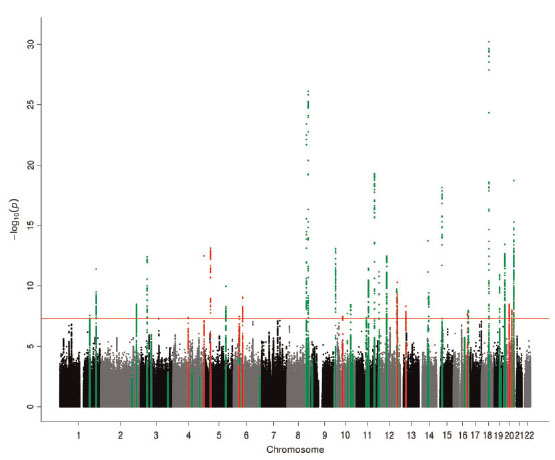Novel Common Genetic Susceptibility Loci for Colorectal Cancer
Genetic predisposition is an important determinant of colorectal cancer (CRC), as demonstrated by the elevated frequency of this disease within the affected families. Besides the several known driver mutations of the key genes implicated in the tumorigenesis, there are also common genetic polymorphisms implicated in CRC. Each of these polymorphisms confers a small increase in risk, but the co-ocurrence of multiple risk alleles in one person defines a relevant risk that may be subjected to personalized screening. The discovery of these polymorphisms requires large scale studies, and it has been demonstrated that as sample size increase, new discoveries are made. Dr. Victor Moreno’s research team is part of big international consortia GECCO (Genetics and Epidemiology of Colorectal Cancer Consortium) and CORECT (Colorectal Cancer Transdisciplinary Study) looking for the genetic variations across the genome, important for elucidating inherited risk factors and their interaction with environmental factors.
 Dr. Moreno and Henar Alonso from ICO-IDIBELL, UB and CIBERESP contributed with nearly 2,000 subjects to this big consortium effort to conduct an extensive Genome-Wide Association Study (GWAS), with a total of 165,315 subjects. The results, published in in the Journal of the National Cancer Institute, describe 11 new variants associated with CRC at p < 5 × 10-8, constituting the 14.7% increase in familial relative risk explained by common risk alleles (from 10.3% to 11.9%). To reach to these results, the study conducted a large GWAS in European descent CRC cases and control subjects using a discovery-replication design, followed by examination of novel findings in a multiethnic sample. This study provides insight into the architecture of common genetic variation contributing to CRC etiology and improves risk prediction for individualized screening.
Dr. Moreno and Henar Alonso from ICO-IDIBELL, UB and CIBERESP contributed with nearly 2,000 subjects to this big consortium effort to conduct an extensive Genome-Wide Association Study (GWAS), with a total of 165,315 subjects. The results, published in in the Journal of the National Cancer Institute, describe 11 new variants associated with CRC at p < 5 × 10-8, constituting the 14.7% increase in familial relative risk explained by common risk alleles (from 10.3% to 11.9%). To reach to these results, the study conducted a large GWAS in European descent CRC cases and control subjects using a discovery-replication design, followed by examination of novel findings in a multiethnic sample. This study provides insight into the architecture of common genetic variation contributing to CRC etiology and improves risk prediction for individualized screening.




No Comment